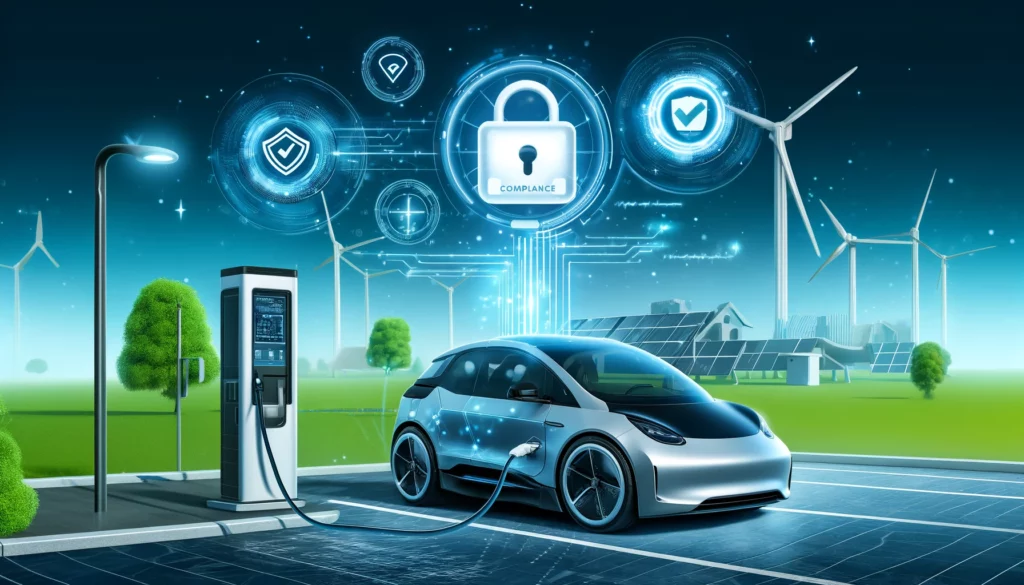As electric vehicles (EVs) become more prevalent, the standards governing their communication and charging infrastructure grow increasingly crucial. One such standard is ISO 15118, which facilitates vehicle-to-grid (V2G) communication interfaces. While ISO 15118 brings significant advancements in terms of efficiency and user experience, it also raises important questions regarding privacy and data protection, especially in the context of the General Data Protection Regulation (GDPR).
Understanding ISO 15118
ISO 15118 is an international standard defining the communication protocol between electric vehicles and charging stations. This protocol supports several functionalities, including:
• Plug & Charge: Seamless, automatic identification and authorization of EVs.
• Smart Charging: Optimized energy management based on grid conditions, user preferences, and pricing.
• Vehicle-to-Grid (V2G): Bidirectional energy flow, allowing EVs to supply power back to the grid.
These features necessitate the exchange of various data types, some of which may be considered personal data under GDPR.
GDPR and Its Relevance to ISO 15118
GDPR is a comprehensive data protection regulation that governs the processing of personal data within the European Union. It emphasizes the principles of data protection by design and by default, ensuring that privacy considerations are embedded in the development and deployment of data processing systems. For organizations implementing ISO 15118, it is crucial to align with GDPR requirements to avoid significant penalties and ensure user trust.

Key GDPR Considerations for ISO 15118
- Data Minimization
GDPR mandates that only the minimum necessary personal data should be collected and processed. For ISO 15118, this means evaluating what data is essential for functionalities like Plug & Charge and smart charging. For instance, while vehicle identification data is necessary for authorization, other non-essential data should be carefully scrutinized and minimized.
- Consent
Under GDPR, explicit consent must be obtained from users before collecting and processing their personal data. In the context of ISO 15118, this involves transparently communicating with EV owners about what data will be collected, the purpose of its collection, and how it will be used. Consent mechanisms should be clear and straightforward, allowing users to easily opt in or out.
- Security
Ensuring the security of personal data is a cornerstone of GDPR. ISO 15118 implementations must incorporate robust security measures to protect data in transit and at rest. This includes using encryption, secure communication protocols, and regular security audits. Given the critical nature of charging infrastructure, securing this data is paramount to prevent unauthorized access and cyber threats.
- Transparency
Transparency is essential for building trust with users. Organizations must provide clear and accessible information about their data processing activities. For ISO 15118, this could involve detailed privacy notices at charging stations or within EV interfaces, explaining how personal data is used, stored, and protected.
- Data Access and Portability
GDPR grants individuals the right to access their personal data and request its transfer to another service provider. In the ISO 15118 ecosystem, this means enabling EV owners to view the data collected about their vehicle and facilitating its transfer if they switch charging service providers. Implementing user-friendly interfaces and backend systems to support these rights is essential.
Implementing GDPR Compliance in ISO 15118
To ensure GDPR compliance while leveraging ISO 15118, organizations should undertake the following steps:
- Conduct Data Protection Impact Assessments (DPIAs)
DPIAs help identify and mitigate privacy risks associated with data processing activities. Conducting DPIAs for ISO 15118 implementations will highlight potential GDPR compliance issues and inform the development of appropriate safeguards.
- Develop Privacy Policies and Procedures
Establish comprehensive privacy policies and procedures tailored to the specific data processing activities under ISO 15118. These should detail how personal data is collected, processed, stored, and shared, as well as the measures in place to protect it.
- Train Staff and Raise Awareness
Ensuring that all employees involved in the implementation and operation of ISO 15118 systems are aware of GDPR requirements and best practices is critical. Regular training sessions and awareness programs can help maintain a high standard of data protection.
- Implement Technical and Organizational Measures
Adopt technical measures such as encryption, access controls, and regular security updates, alongside organizational measures like data protection policies and incident response plans. These combined efforts will help safeguard personal data and ensure compliance with GDPR.
- Engage with Users
Foster an open dialogue with EV owners about data protection practices. Providing channels for users to ask questions, provide feedback, and exercise their rights can enhance trust and demonstrate a commitment to privacy.
Conclusion
ISO 15118 represents a significant advancement in the EV landscape, offering enhanced functionality and user convenience. However, its implementation must be carefully managed to align with GDPR requirements. By focusing on data minimization, obtaining explicit consent, ensuring security, maintaining transparency, and supporting data access and portability, organizations can harness the benefits of ISO 15118 while upholding the highest standards of privacy and data protection. As the EV ecosystem continues to evolve, prioritizing GDPR compliance will be essential in fostering trust and promoting the widespread adoption of these innovative technologies.